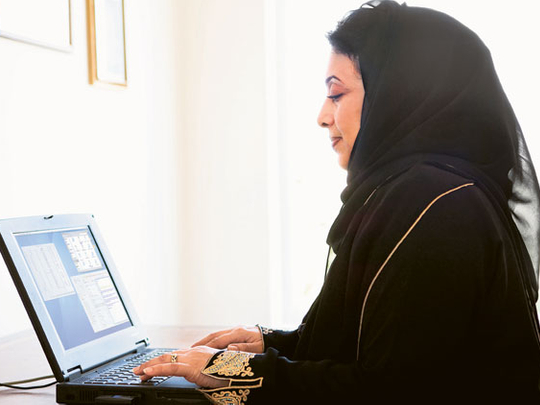
Dubai: An exhaustive new survey of nationals living in the Gulf Cooperation Council (GCC) suggests women should play a larger role in the workplace to boost productivity.
The findings stem from interviews conducted in five countries in the region as part of a sweeping survey released yesterday morning in Dubai.
According to the report, women make up 18 per cent of the regional workforce and 30 per cent of unemployed females possess university degrees.
Survey authors Aon Corporation said: "[The] research suggests that women in the Middle East are clearly willing and very capable, and that they report a greater degree of alignment and readiness to the modern GCC workplace than men in many aspects. It firmly sets the challenge to employers and policy-makers to ensure that they are ready to fully benefit from the value of more women in the office."
Less engaged
"[The] Qudurat report, a pioneering research study into the advancement of national talent, [is] the single biggest HR issue in the region," said HR and outsourcing consultant Aon Corporation. "Qudurat — meaning capabilities in Arabic — is the first and largest research of its kind in the region, dedicated to national talent in the workplace, and represents the voices of 4,600 employees across five GCC countries."
Men are more likely to be working in the region than women, the survey said. "The results show that on average, women are less engaged than their male counterparts in the region, with engagement scores of 50 per cent and 57 per cent respectively. Moreover, GCC national women and Emirati women in particular are the least engaged," it said.
Employed women, meanwhile, are making professional decisions that are not always in sync with family expectations, the survey said. As many as "70 per cent of women responded that in a situation where their family disagreed with an important decision related to their job, they would follow their own choice versus following the wishes of their family. This defies convention, as it might be expected that female employees may respond in more traditional ways," said the survey.
"Relatively low levels of female participation in the GCC workforce, combined with continuing changes in the social position and expectations of young women, imply that there is a further latent potential supply of labour ready to take up work." Dr Markus Wiesner, CEO, Aon Hewitt Middle East, said in a statement that the study "is the biggest and most robust of its kind ever conducted in the GCC," adding that a second companion study will get underway by year end and will aim to involve 100,000 survey participants by 2013.
David Jones, chief consulting officer at Aon Hewitt in the Middle East, said the survey findings break new ground.
"We are now able to vigorously contest many stereotypes about talent in the region," he said.
- 18%: share of women inregional workforce
- 30%: unemployed womenwith degrees
- 53.5m: estimated GCC population by 2020
increased pressure
- By 2020, the GCC population is forecast to reach 53.5 million, a 30 per cent increase over 2000. The Arab world is expected to grow to 598 million by 2050.
- More than 60 per cent of the region's population is under the age of 30 as a result of high fertility rates. This is putting increasing pressure on labour markets to create the right opportunities to meet the accelerating growth of the indigenous labour supply in the region.
— Source: Aon Corporation












